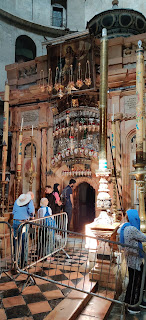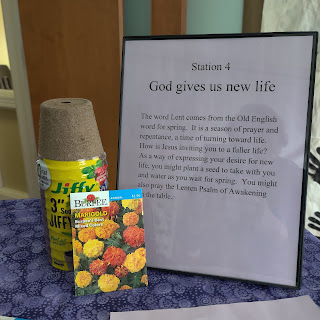Elizabeth made it to Israel without too much difficulty.
After rescheduling our flights because I came down with COVID a week before we
were scheduled to fly, we decided to send Elizabeth on ahead so she could start
the class in Jerusalem pretty much on time, while I needed to wait a bit longer
before I was cleared to fly.
Elizabeth arrived on Tuesday, just a day late. She missed
some of the orientation and a trip to the Church of the Holy Sepulcher, but not
too much else. She navigated all of the airport transfers and luggage pick-up
and airport COVID test and shared taxi to Jerusalem like a pro. She settled in
well and started making new friends.
I, on the other hand, have been a different story. The plan
was that I would fly the next day after I cleared COVID protocols. But this
meant I had a different itinerary that had me flying from Grand Rapids to
Newark to Brussels to Tel Aviv. I smiled when, as I checked in at the airport,
I looked over and discovered Chad Gunnoe standing next to me waiting to drop
off his luggage. He was on his way to Iceland with a student group from
Aquinas.
I should have taken it as a bad omen, though, when he told
me he had been scheduled to fly out the day before but their flight had been
canceled. He had spent nine hours on the phone with United trying to get his
group rescheduled, only to end up with two of them going straight to Iceland while
the other eleven were heading to Germany where they would have to spend the
night in Heidelberg before going on to Iceland (ironically without, it should
be noted, Chad Gunnoe—an expert in the history of Heidelberg).
That first flight was delayed by about an hour. That wasn’t
too bad because I had two hours scheduled in Newark before heading to Brussels.
As we deplaned, I asked Chad if they were going to be okay despite the delay,
and he noted that they had a six-hour layover. I cringed and said I should
probably get off to my flight that was now less than an hour away.

Five hours later, after my flight had been delayed again and
again as they replaced and then rescheduled a malfunctioning module in our
airplane, I looked over as I got into line now late at night and discovered
that I was lining up next to the gate for Reykjavik. And sure enough, there was
Chad, getting on his plane before I was getting on mine. I had spent most of
the last five hours in line at the United customer service counter trying to
reschedule my connecting flight to Tel Aviv, since it was clear I would not
make my connection in Brussels. Thankfully I was able to connect over the phone,
after waiting on hold for almost an hour. They rescheduled me for a later
flight connecting through Frankfort, this time on Lufthansa. I didn’t really
want yet another connecting flight, but at least I was still scheduled to get
into Tel Aviv the same day I had been expecting.
When we landed in Brussels I grabbed something to eat and
then made it to the Lufthansa gate once they announced where it was. I asked at
the gate for my boarding pass since the reservation change had been made over
the phone. They were extremely unhelpful, however, and refused to let me board
the flight. At one point the gate agent turned her back on me and refused to acknowledge
that I was even there. Before turning her back, she told me I would need to leave
the terminal and find a United representative and have them reschedule my
flight. But then she refused to tell me where I might find such a United
representative or explain exactly what she meant.
I tried another gate where a Brussels Air flight that was
also a United flight was about to leave. She kindly informed me that all the
United people had already gone home—they were only there in the morning. I left
the terminal and tried to find the United check-in. The counter where it was
supposed to be now proudly displayed Qatar Airlines. I asked at the information
desk—United is only there in the morning and they had all gone home. And now I
couldn’t get back in the terminal because I didn’t have a boarding pass.
I tried calling United. After waiting on hold for another
hour, I finally started talking to someone. He said he could change my flight,
but I’d have to pay a change fee. I kindly informed him it was United’s fault I
was stuck in an airport in Brussels. After significant back-and-forth, he
finally rescheduled me for the next day’s direct flight to Tel Aviv at no
additional charge. But I’d have to stay overnight in Brussels. And figure out
what happened to my luggage.
After spending another 45 minutes trying to track down my
luggage, the representative asked if I had another flight scheduled. I said
yes, so she said not to worry about it—it’s better to leave it at the airport
and it will get connected to my next flight.
I then found a nearby hotel reservation for the night and
tried to figure out the hotel shuttle. I was back at the airport before 7 the
next morning so I’d have time to find a United representative if there were any
difficulties. This time, however, I had no issues getting my boarding pass—this
time on Brussels Air. I made sure to note there was luggage somewhere at the
airport that needed to go with me, and they assured me they would add it. I
then found myself with plenty of time before my flight, so I breathed a bit
easier, hopeful I would finally make it to Tel Aviv. I must admit that as I
spent the night in Brussels, I had wondered if perhaps I would be better served
just turning around and going home.

The flight into Tel Aviv was uneventful. Once I landed and
made it through customs, however, my luggage was no where to be found. I waited
in line for forty-five minutes to make a claim, and—sure enough, it was still
waiting in Brussels. Hmm…it should get here tomorrow, they said. That would be
Friday. But then the next day was Sabbath, so they wouldn’t be able to deliver
it until Sunday.
It's now Monday evening, and I still don’t have my bag. I’ve
been wearing the same clothes I boarded the plane with last Tuesday. I’m
hopeful that maybe my bag will come late tonight. There’s a staff member from
Jerusalem University College flying in to Tel Aviv tonight, and they have all
my bag information, and will stop at the luggage claim and try to pick it up
for me. If it’s there. And if they let these people take it for me. And if they
can find it (another student had his luggage delayed as well—and it was just
sitting in a pile in a back room at the airport until someone went to pick it
up).
We leave for a three-day excursion to the desert tomorrow,
leaving at 7 am. I’d really like to have my bag before then. In the grand scheme
of things, however, I suppose it’s a fairly mild inconvenience. Mostly I’m just
grateful to finally be here. There were moments I wasn’t sure I would make it.
In the end, I missed three days of class, but the days I’ve been a part of have
been intense and good—pretty much everything we had hoped for and expected. We’ve
already seen some amazing sites. We’ve done a lot of hiking. We’ve deepened our
understanding of Scripture and in particular the land and how knowledge of the
land informs our reading of Scripture. We’ve decided to do a fall sermon series
on the book of Deuteronomy (well, maybe not…). And we’ve grown in our
appreciation for God’s care for us.
This series of unfortunate events (that’s not quite over yet…)
has been hard. But it’s reminded me yet again that we are dependent upon God.
And God cares for us.
One of the lessons we’ve learned in class this week is that
a land “flowing with milk and honey” doesn’t mean prosperous and lush. That was
Egypt. God tells the people in Deuteronomy 11:10 that the land God is leading
them to is not like what they knew in Egypt where they could plant seeds, and
if they needed to irrigate them, they could just drag their foot from the river
and make a path for water. No—this new land was going to be harsher. Water
would be much scarcer. In some places, you won’t be able to grow anything—sheep
and goats might barely survive on what little green there is. But it’s a land
God cares for. A land God watches over. You will be dependent upon God, but
know that God loves you.
This last is a lesson we sometimes forget. But it’s no less
true for us as it was for ancient Israel. We are dependent upon God. And that’s
okay. Because God loves us.














